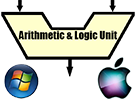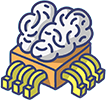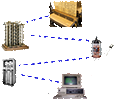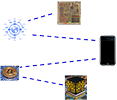
Computers Are Not Magic is a broad but shallow survey of the entire computer phenomenon, from the lowest levels (wires that carry data) to the highest levels (artificial intelligence, animated movies, crypto currency, etc). The goal is to show how everything builds, one layer at a time, to create these incredible machines.
The course runs for eight weeks and presents 13 different lessons. Some of the weeks pack in two lessons, but others present more involved topics that take up the entire class time.
If you click on the “hamburger” in the upper-right of this web page, you will see notes for a different class that I teach to homeschoolers. The homeschool class has two parts: (1) coding lessons in the Java programming language and (2) “curiosity” lessons about computers. This OLLI class is the “curiosity” lessons without the tedious Java programming instruction.
The lessons move quickly because there's a lot of material to cover. To help students process this, all of the slides are available here for you to view and download. Watch this list, and you will see the link for each class activate a few days before the lesson is given.
 Week 1, lesson 1 (September 11): Computer DataHow numbers, text, pictures, sounds, and movies are stored in a computer's memory. |
||
 Week 1, lesson 2 (September 11): Computer ProgrammingProgramming concepts: variables, computations, conditionals, loops, arrays, and objects. |
||
 Week 2, lesson 1 (September 18): HardwareThe switches that make a computer think, how chips are made, and how other computer devices work. |
||
 Week 2, lesson 2 (September 18): From Bottom to TopThe hidden but essential parts of every computer, including machine code and operating systems. |
||
 Week 3, lesson 1 (September 25): The InternetThe “stack” that runs the Internet, and the many enhancements that make it sparkle. |
||
 Week 3, lesson 2 (September 25): PublishingHow to create a website, publish a book, and offer streaming music. |
||
 Week 4, lesson 1 (October 9): Graphics ConceptsBasics of computer graphics: color, texture, modeling and rigging. |
||
 Week 4, lesson 2 (October 9): Graphics RenderingAdvanced computer graphics: cameras, lights, animation, and virtual reality |
||
 Week 5 (October 16): Artificial IntelligenceThe two aspects of intelligence (perception and cognition), and the many pitfalls that make A.I. neither artificial nor intelligent. |
||
 Week 6, lesson 1 (October 23): Early Computer HistoryFrom the distant past up to 1970. |
||
 Week 6, lesson 2 (October 23): Recent Computer HistoryFrom the 1970s to today. |
||
 Week 7 (October 30): Encryption, Blockchain, and CryptoProtection with math: secure communication, Bitcoin, and other crypto currencies. |
||
 Week 8 (November 6): Hacking, Legality, and PrivacyBreaking computers, legal protections, and threats to your privacy. |
||